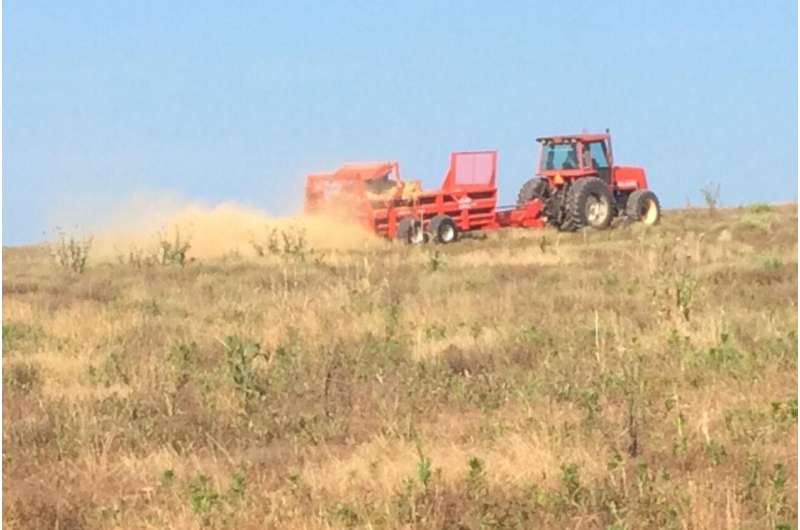Recycling nutrient-rich industrial waste products enhances soil, reduces carbon

Recycling biotechnology byproducts can enhance soil health while reducing carbon emissions and maintaining crop yields.
A recent paper in Agrosystems, Geosciences & Environment examines the possible benefits of a new kind of crop fertilizer. Researchers from the University of Tennessee Institute of Agriculture, along with collaborators from DuPont, USDA, MetCorps, and Oklahoma State University, studied two fields of maize (Zea mays L. var. indentata): one plot treated with heat-inactivated spent microbial mass (SMB), and one plot treated with a typical farmer fertilizer practice. SMB is a biotechnology waste byproduct that can provide nutrients contained in conventional fertilizers. Over the course of one year, researchers measured the net ecosystem exchange of carbon dioxide (net CO2 emissions) between the crop surface and atmosphere of the two plots. Researchers also measured yields of maize over two growing seasons, in addition to changes in soil carbon over 1.7 years.
"Reusing industrial biotechnology by-products has become an important component of circular bio-economies," says Deb O'Dell, lead investigator. During the research, O'Dell was a graduate research assistant in the Department of Biosystems Engineering and Soil Science, working under the guidance of co-author and soil science professor Neal Eash. "When nutrient-rich wastes are returned to agricultural land, soil fertility improves and crop productivity increases," says Eash. "Also, re-using waste streams can reduce greenhouse gas emissions and improve soil fertility, which could generate greater environmental benefits as well." James Zahn of DuPont Tate & Lyle Bio Products, LLC, adds that, "Applying the rich source of nutrients in DuPont's biotechnology waste to agriculture has potential not only to replace mineral fertilizers but to enhance the soil and improve agricultural production."
According to the research findings, the addition of SMB provided similar crop yields to that of typical farmer fertilization practices; however, the SMB had to be applied at greater rates. The team also found the annual net ecosystem exchange of carbon dioxide was greater for the SMB application than for the farmer practice plot, although some excess emissions appear to be recycled back into the ecosystem. "The greater application of SMB shows the potential to enrich ecosystem productivity and environmental sustainability through the conversion of waste nutrients into greater yields, greater plant biomass and increased soil carbon," the paper's authors suggest.
Overall, the research found that utilizing carbon-rich waste nutrients increases soil organic matter, improves the physical and chemical properties of the soil, and creates a reservoir of plant nutrients, providing environmental and agricultural benefits that extend beyond the immediate application and harvest yield.
More information: Deb O'Dell et al, Nutrient Source and Tillage Effects on Maize: II. Yield, Soil Carbon, and Carbon Dioxide Emissions, age (2019). DOI: 10.2134/age2019.05.0036
Journal information: AGE
Provided by University of Tennessee




















